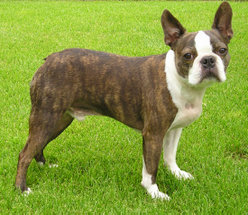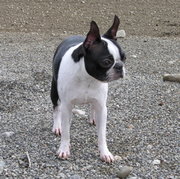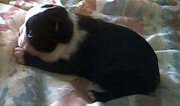Boston Terrier
Dogs
Boston Terrier
| Boston Terrier |

Boston Terrier with brindle coat
|
| Alternative names |
Boston Bull
Boston Bull & Terrier |
| Country of origin |
|
United States |
| Common nicknames |
| |
| Classification and breed standards |
|
FCI: |
Group 9 Section 11 #140 |
|
|
AKC: |
Non-sporting |
|
|
ANKC: |
Group 7 (Non-Sporting) |
|
|
CKC: |
Group 6 - Non-Sporting Dogs |
|
|
KC (UK): |
Utility |
|
|
NZKC: |
Non-sporting |
|
|
UKC: |
Companion Breeds |
|
| Not recognized by any major kennel club |
| This breed of dog is
extinct |
| Notes |
| |
The Boston Terrier is a
breed of
dog originating in
the United States of America.
Appearance
Boston Terriers are typically small, compactly built, well proportioned,
dogs with erect ears,
short
tails, and a short
muzzle that
should be free of wrinkles. Boston terriers can weigh from 10 to 25 lb,
typically in the vicinity of 15 lb. The breed is known for its gentle, alert,
and intelligent expression.
 14 month-old Boston Terrier; 10 lb
14 month-old Boston Terrier; 10 lb
The Boston Terrier is characteristically marked with white in proportion to
either black,
brindle, seal, or a combination of the three. Seal is a color specifically
used to describe Boston Terriers and is defined as a black color with red
highlights when viewed in the sun or bright light. Ideally white should cover
its chest, muzzle, band around the neck, half way up the
forelegs,
up to the
hocks on the
rear legs,
and a white blaze between but not touching the eyes. In the
show ring,
symmetrical markings are preferred. Due to the Boston Terrier's markings
resembling
formal
wear, in addition to its refined and pleasant personality, the breed is
commonly referred to as the "American Gentleman."
Frequently, variations on the standard are seen depending on the ancestry of
the individual dog. At various times, the
English Bulldog,
English Mastiff,
Staffordshire Bull Terrier, and
French Bulldog—among other breeds—have been crossbred with Boston Terrier
lines to minimize inbreeding in what is necessarily a small gene pool.
Temperament
 Young Boston Terrier pup with black coat and white markings
Young Boston Terrier pup with black coat and white markings
Bred for companionship, the modern Boston Terrier can be gentle, alert, and
well-mannered; however they may be difficult to potty train in the beginning.
They're known to be quite rambunctious, with a sense of humor. Some Bostons
enjoy having another one for companionship. Both females and males generally
bark only when necessary. Having been bred as a companion dog, they enjoy being
around people, and if properly socialized get along well with children, other
canines, and non-canine pets. Boston Terriers can be very cuddly, while others
are more independent. Some Boston Terriers have an excitable or dominant
temperament that requires special training and handling by the owner. Some are
aggressive towards other dogs and some dogs are just attached to one person.
Boston Terriers do not typically realize that they are small animals and are not
afraid to confront larger dogs or other animals.
Health
Several health issues are of concern in the Boston Terrier:
cataracts
(both juvenile and adult type),
cherry eye,
luxating patellas,
deafness,
heart
murmur, and
allergies.
Curvature of the back, called roaching, might be caused by
patella
problems with the rear legs, which in turn causes the dog to lean forward onto
the forelegs. This might also just be a structural fault with little consequence
to the dog. Many Bostons cannot tolerate excessive heat and humidity due to the
shortened muzzle, so hot weather brings the danger of
heat exhaustion.
History
The Boston Terrier breed originated around 1870, when Robert C. Hooper of
Boston purchased a dog known as Hooper's Judge, a cross between an English
Bulldog and a white English Terrier. The English White Terrier as a breed is
currently thought to be extinct. In 1893, the
American Kennel Club (AKC) admitted the Boston Terrier breed and gave the
club membership status—making it the first American breed to be recognized.
Miscellaneous
Rhett the Boston Terrier is the well-known mascot of
Boston University.
In 1979, the state legislature recognized the Boston Terrier as the state dog
of
Massachusetts.
References
- Meade, Scotteee (2000). The Boston Terrier. Howell Book House.
ISBN 1-58245-159-1.
- Cline, Mrs. Charles D. (1995). Boston Terriers. T.F. H.
Publications, Inc.
ISBN 0-7938-2397-8.
- Bulanda, Susan (1994). Boston Terriers. Barron's Educational
Series, Inc.
ISBN 0-8120-1696-3.
External links
Home | Up | Bandog | Barbet | Basenji | Basset Fauve de Bretagne | Basset Hound | Bavarian Mountain Hound | Beagle | Bearded Collie | Beauceron | Bedlington Terrier | Belgian Shepherd Dog | Belgian Shepherd Dog (Groenendael) | Belgian Shepherd Dog (Laekenois) | Belgian Shepherd Dog (Malinois) | Belgian Shepherd Dog (Tervueren) | Bergamasco | Berger Blanc Suisse | Bernese Mountain Dog | Bichon Frisé | Biewer | Black Russian Terrier | Black and Tan Coonhound | Bloodhound | Bluetick Coonhound | Boerboel | Border Collie | Border Terrier | Borderjack | Borzoi | Bosnian Tornjak | Boston Terrier | Bouvier des Flandres | Boxer | Boykin Spaniel | Brazilian Terrier | Briard | Brittany | Bull Terrier | Bull Terrier (Miniature) | Bull and Terrier | Bulldog | Bullmastiff | Bully Kutta
Dogs, made by MultiMedia | Free content and software
This guide is licensed under the GNU
Free Documentation License. It uses material from the Wikipedia.
|




